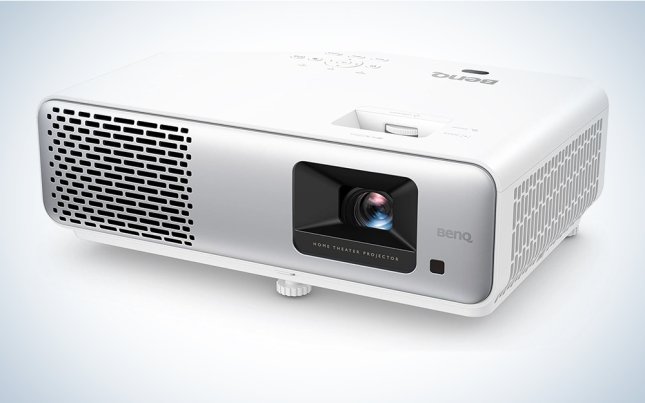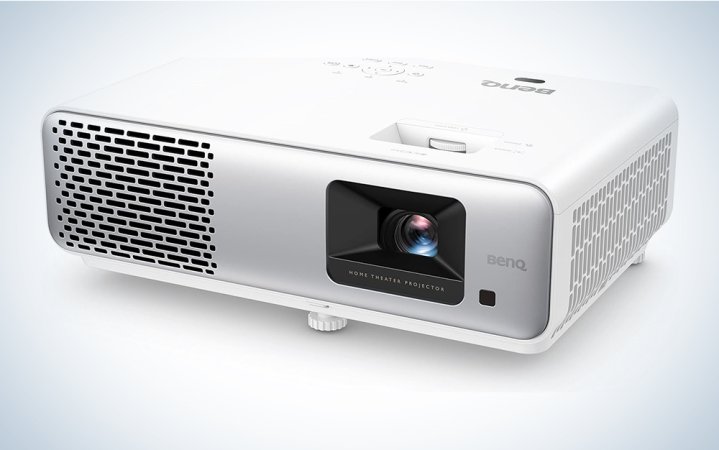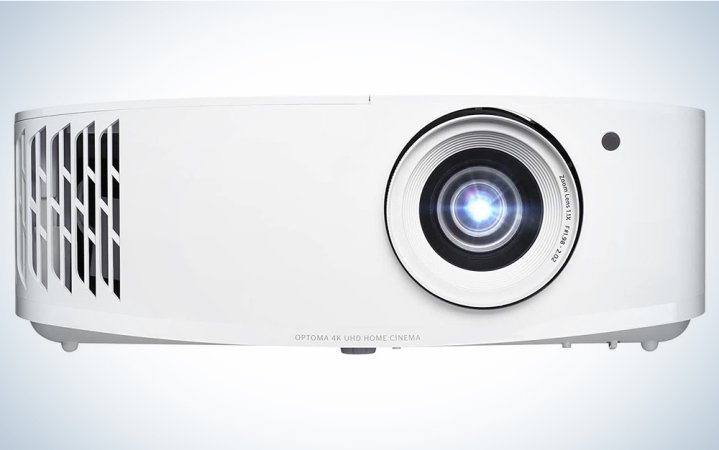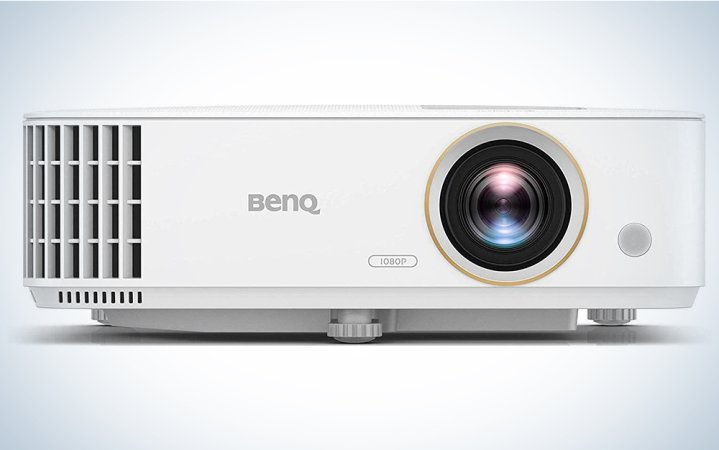We may earn revenue from the products available on this page and participate in affiliate programs. Learn more ›
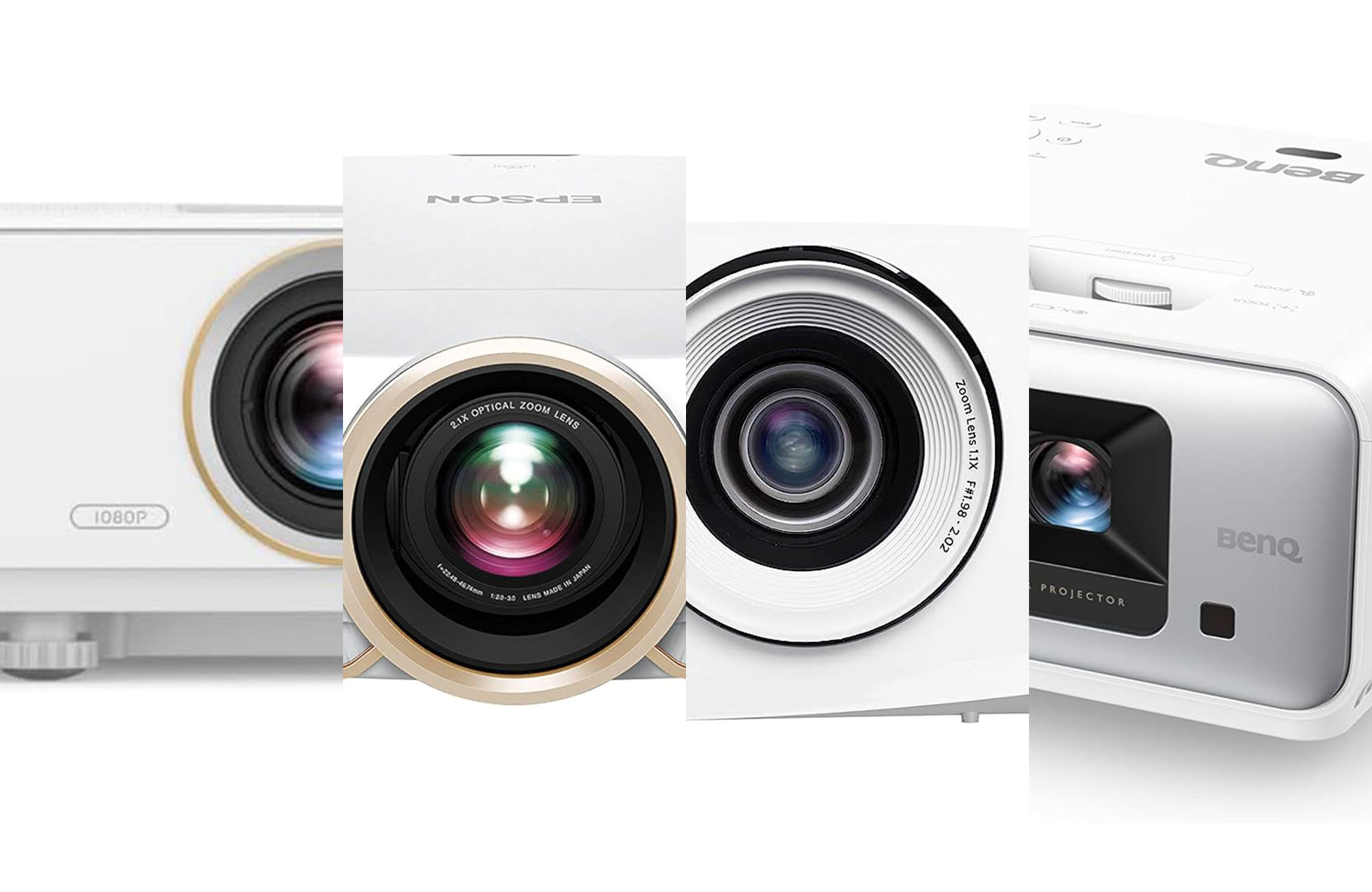
The best part about owning home theater projectors is watching your shows with all the immersive fun of sitting in a movie theater. That 65-inch flatscreen is great, but nothing compares to sitting and watching that giant Star Destroyer descending down your entire wall in the opening shot of Star Wars. Home projectors bring that experience to your living room, den, or, if you’re lucky, a dedicated movie room.
Projectors for home theater also provide the flexibility you don’t often find with TVs, especially large ones. They take up much less space in a room, and aren’t an unsightly decorating “dead zone.” With a home projector, you can even take the show outside. Set one up on the deck for a romantic night of movie-watching under the stars. (Again, that Star Destroyer under the night sky would be pretty sweet!) Not all home theater projectors are the same, though, and it’s important to match the right device with your viewing habits, space, and overall needs. With that in mind, we’ve, well, screened the options, and collected our selections and considerations for the best home theater projectors.
- Best HD: BenQ HT2060
- Best 4K: Epson Home Cinema 5050UB
- Best for gaming: Optoma UHD38x
- Best value: Epson EpiqVision Mini EF12
- Best outdoor: BenQ TH685P
How we chose the best home theater projectors
When selecting the best home theater projectors, we looked at many different units. We read reviews, both from industry insiders and owners, and scoured manufacturers’ technical specs. Projectors were evaluated based on brightness, picture quality (particularly in terms of sharpness, color, and contrast), resolution, chip type, and refresh rate. We wanted to know how a projector performed not only in specially designed movie rooms, but also rooms with ambient light or outdoors. For gaming, we compared lag times among units to see which could keep up with players’ reflexes. While not a primary concern, extra features, like lens shift and motorized lenses, or audio capabilities, were noted and considered as well.
The best home theater projectors: Reviews & Recommendations
The best home theater projectors produce a sharp image with strong contrast and bright, vibrant colors. They fit into your life, both literally (producing the right size image for your room) and figuratively (price and ease of use). In short, the best projectors for watching movies and programs at home deliver the entertainment you expect from a standard TV, only much, much larger. Pair that with the right home theater sound system for your space and be transported into fantastical worlds without leaving the house.
Best HD home theater projector: BenQ HT2060
Best HD home theater projector
Slim Design
Pros
- Excellent color and contrast
- Lens shift
- 3D compatible
Cons
- No support for HDR
- Can’t play 4K video
Why it made the cut: Darker blacks, bright whites, and realistic colors all help the BenQ HT2060 punch above its price point.
Specs
- Product Dimensions (HWD): 19 x 15.5 x 8.8 inches
- Brightness: 2,200 lumens
- Chip Type: DLP
- Resolution: 1080p HDR
- Video input: HDMI
If the BenQ HT2060 only delivered a great picture at a lower price point, it would be enough to make this the best HD home theater projector. But projecting a 100-inch screen from just 8 feet away (with the ability to project up to 300 inches) combined with having vertical lens shift (rarely found on DLP chip projectors) really makes the unit stand out among its peers.
The high contrast ratio and natural colors deliver a strong, cinema-like picture at up to 1080p resolution at 8.3ms 120Hz. While the company claims the bulb outputs 2,200 lumens, some review tests show it coming in around 1,600. But that’s still bright enough to deliver a large image even in rooms without blackout curtains.
The HT2060 accepts video from two HDMI 2.0 inputs, as well as a USB connection that has a 1.5-amp output to drive a streaming stick without external power. You’ll also find older, analog audio and video inputs, including both component and composite—just what you need if you’re still rocking the old VHS player. (We won’t judge.) And Built-in 5Wx2 speakers if you do.
The DCI-P3 and 98-percent Rec. 709 color accuracy calibration contributes to picture quality, though the BenQ does suffer from rainbows—multicolored trails left by bright objects on the screen. It’s a problem found with all projectors with single DLP chips, though many people either don’t notice them or simply aren’t bothered by them. For some, however, they’re deal-breakers so make sure you know how you feel about them before considering a single-DLP player.
Best 4K home theater projector: Epson Home Cinema 5050UB
Best 4K home theater projector
Color Me Impressed
Pros
- Excellent picture quality
- High contrast ratio
- Horizontal and vertical lens shift
- Motorized zoom
- Full DCI-P3 color
Cons
- Bulkier than many high-end units
Why it made the cut: This best 4K home theater projector is designed for home-theater enthusiasts, with bold colors and contrast that deliver inky shadows and razor-sharp highlights.
Specs
- Product Dimensions (HWD): 7.6 by 20.5 by 17.7 inches
- Brightness: 2,600 lumens
- Chip Type: 3LCD
- Resolution: 4K
- Video input: HDMI
The light engine under the Epson Home Cinema 5050UB’s hood uses “4K enhancement” technology and pixel-shifting to create a high-resolution image out of its three HD LCD chips. The jury’s out on whether this delivers a sharper picture than a true 4K DLP chip, but that doesn’t change the fact that movies look absolutely gorgeous with 100 percent of the RGB color signal displayed for every frame.
The 5050UB owes much of its success to the 2,600-lumen bulb, one of the brightest in its class. Even more so, UltraBlack 1,000,000:1 dynamic contrast ratio and full 10-bit HDR processing results in dark, silky blacks and punchy highlights that make movies pop.
Epson’s projector lacks audio outputs, but that’s typical for this class of unit; the company assumes users will run audio through an AV receiver and speakers for optimal sound. Additional features like a motorized lens with both horizontal and vertical shift, plus motorized zoom, make setting up the Epson 5050UB simple and fast.
Best home theater projector for gaming: Optoma UHD38x
Best home theater projector for gaming
Smooth Operator
Pros
- 240 Hz refresh rate and lag as low as 4.2 ms at 1080p with Enhanced Gaming Mode
- Supports 4K and HD gaming
- High contrast ratio for a crisp-looking picture
Cons
- Minimum throw distance of six feet
- Minimal zoom and lens shift makes it hard to position
Why it made the cut: An extremely short lag time combined with an excellent 4K and HD picture makes the Optoma UHD38x projector a gamer’s best friend.
Specs
- Product Dimensions (HWD): 4.65 by 12.4 by 10.63 inches
- Brightness: 4,000 lumens
- Chip Type: DLP
- Resolution: True 4K
- Video input: HDMI, DVI
Quick reactions win video games, so a TV or projector’s blur-free visuals and unparalleled smoothness are a must. The Optoma UHD38x’s 240 Hz refresh rate keeps lag time down to as low as 4.2 ms in Enhanced Gaming mode. The bright, 4,000-lumen bulb, a high contrast ratio, and jewel-like colors create a picture that captures all the dynamic energy of both games and movies. The 4K UHD 60 Hz or 1080p 120 Hz resolutions, plus HDR10 and HLG content compatibility, makes all your content look great and blur-free, making this projector our choice for the best home theater projector for gaming.
Set-up is a little tricky. The UHD38x’s lens isn’t motorized, and it has minimal lens shift or physical zoom. You’ll have to position it right in the middle of your screen in order to get the best image and, with its relatively long throw, the closest it can focus is 6 feet.
Best value home theater projector: Epson EpiqVision Mini EF12
Best value home theater projector
Compact Design
Pros
- Laser light source lasts longer than a bulb
- Three-chip LCD imaging for higher contrast ratios
- Integrated Smart TV components
- Supports 4K content (downconverted to 1080p)
Cons
- Only 1,000 lumens
- No true 4K resolution
Why it made the cut: The Epson EpiqVision Mini EF12 includes a built-in Android TV and Google Play Store apps, making it as much a smart TV as a high-quality HD projector.
Specs
- Product Dimensions (HWD): 5.3 by 6.9 by 6.9 inches
- Brightness: 1,000 lumens
- Chip Type: LCD
- Resolution: 1080p
- Video input: HDMI
Saying something is the best budget is relative in home theater projectors, but getting a ton of quality for a grand qualifies. Oh, you can go cheap (even cheap-cheap) when it comes to projectors, but if you want the best value projector that can still do a home theater justice, the Epson EpiqVision Mini EF12 Smart Streaming Laser projector delivers, enabling streaming video services with built-in Android TV and Google Play Store apps. The projector uses a laser-illuminated, three-chip LCD to create a picture with sharp contrast and natural colors.
While the laser-phosphor light source isn’t the brightest at only 1,000 lumens, in a dark room it still provides a large, immersive show at up to 150 inches. Besides all the built-in content channels and the ability to project connected device content wirelessly via Chromecast, the EF12 has two HDMI ports for HD or downconverted 4K video sources.
Built-in, dual 5-watt speakers provide robust sound and the projector connects to an external sound source via 3.5mm output jacks, HDMI ARC, or even Bluetooth. All this versatility makes for a great choice from the gaming pod to the classroom.
Best outdoor home theater projector: BenQ TH685P
Best outdoor home theater projector
Star Light, Stars Bright
Pros
- Color and contrast good at this price point
- Bright 3,500 lumen lamp
- Supports HDR programming
- Accept 4K input, downconverted to 1080p
Cons
- Can’t read files from USB memory sticks
Why it made the cut: Even in ambient light, the BenQ TH685P’s 3,500-lumen lamp delivers a sharp picture with nice contrast and accurate color, making this ideal for an evening of outdoor movie watching.
Specs
- Product Dimensions (HWD): 12.28 by 8.86 by 4.33 inches
- Brightness: 3,500 lumens
- Chip Type: DLP
- Resolution: 1080p
- Video input: 4K HDMI
The BenQ TH685P makes hosting an outdoor movie night easy, with a bright, 3,500-lumen lamp that cuts through ambient light spilling from your living room, the neighbor’s home, or a full moon. It’s adjustable to throw distances of 80 inches to 150 inches. And the onboard, 5-watt mono speaker has a chamber design that delivers more muscular sound than you’d expect; you still might want to bring some speakers out to the patio (it has an audio output on the back), but this saves you that hassle if you’re keeping your set-up simple.
Two HDMI 2.0 ports accept both 1080p and 4K signals, though the 4K gets downconverted to HD. Nonetheless, the resulting image remains sharp, with 95-percent Rec. 709 color. Unfortunately, you can’t feed content from a USB device, so you’ll need to have a Blu-ray player or a computer with an HDMI output as part of your theater setup. The TH685P supports HDR10 and 3D programming. An added bonus: At 120 Hz in 1080p, the BenQ has a lag time of 8.3 ms, making this a useful projector for gamers in addition to being the best outdoor home theater projector.
Things to consider before buying the best home theater projectors
Bright ideas
Of all a projector’s specs, none shine like the number of lumens. Lumens describes how much light a projector can create, which translates into how bright and large your image can be. Often, units with higher lumens cost more, so you’ll have to balance price and performance when making your selection. While this all might seem straightforward, no company measures lumens in exactly the same way. In broad strokes, if one projector is described as being 2,000 lumens and the other is 1,000, you can say for certain the first one is brighter. But if one is 2,000 and another is 2,200, it’s hard to know if the latter is really brighter, or if the manufacturers are using different scales. On the other hand, in most cases, your eyes probably can’t tell the difference between 2,000 and 2,200 anyway.
Let there be light
To play your movie on the big screen, a projector’s light source creates the light, which is then focused on a chip that generates an image. Light sources come in three varieties: Lasers, LEDs, and Ultra High Pressure (UHP) lamps. The UHP lamps, which are basically high-powered light bulbs, cost the least and generate the most light. The downside is that, over time, they can wear down and need replacing. However, it can take years before that happens, and the replacement bulbs usually cost less than $300. LEDs and lasers are more efficient than UHP lamps but cost much more for the same performance. For the time being, UHP lamps still give the most bulb for the buck.
Chipping away
Projectors use one of three types of imaging chips: DLP, LCD, and LCoS. DLP chips are found in products at many price points and deliver average contrast and decent color. LCD chips can be found on budget to mid-range projectors and often have better color than DLP projectors, but the contrast ratios can sometimes suffer. Finally, LCoS chips can be found on mid-range to high-end projectors, have the best contrast ratios, and good color. In the end, LCoS projectors usually beat the others in terms of overall picture quality, which is why they tend to cost more.
Room with a view
Before deciding on a projector, know where you want to use it and how you want to set it up. Will the projector sit far from the wall? If so, you’ll want a projector with a long throw. Some projectors are meant to sit on furniture while others are mounted to the ceiling. If your projector doesn’t have built-in lens shifting, you’ll need to place the unit on something that can be adjusted up or down. It’s better to sort out these details ahead of time than to get home with your new projector and discover it won’t work well in your movie room.
FAQs
It’s worth getting a 4K projector if you enjoy watching 4K content on screens big enough to feel immersive. At, say, 100 inches, the smaller pixels of a 4K projection will remain crisper than those of a 1080p unit. But this comes at a cost and, if you’re on a budget, you can still have a great viewing experience using a 1080p projector in your home theater.
More lumens do not, on their own, mean a better projector. Brightness plays a role in delivering a great picture, especially in rooms with ambient light, but it’s not the whole story. Chip design is important, too. Resolution, lens construction, playback formats, refresh rate, and lag time—these all work together to determine which is the projector that best suits your needs.
You can watch Netflix on a projector, along with any other streaming service. You’ll need some sort of streaming device, like a Roku, with an HDMI output. Plug that in with an HDMI cable to the back of your projector, and you’re good to go.
Final thoughts on the best home theater projectors
- Best HD: BenQ HT2060
- Best 4K: Epson Home Cinema 5050UB
- Best for gaming: Optoma UHD38x
- Best value: Epson EpiqVision Mini EF12
- Best outdoor: BenQ TH685P
If you’re a movie fan, the Epson Home Cinema 5050UB is a hard projector to beat and our best overall pick. With great color and contrast, plus a bright light source, it delivers a 4K picture that looks great on a big screen and captures the experience of sitting in a real cinema. The motorized lens with horizontal and vertical shift makes it easy to set up, so you’ll be enjoying blockbusters in no time. But no matter what model you opt for, don’t forget the popcorn!
